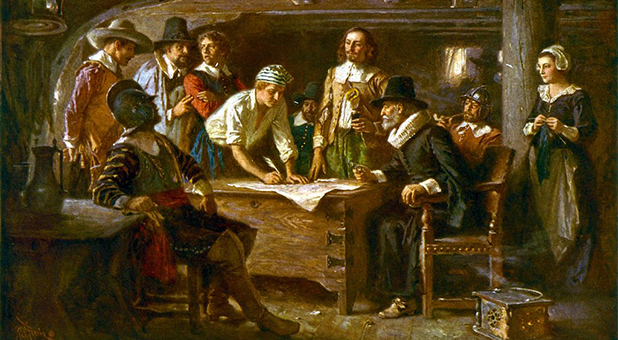Common Sense: Freedom of Religion Is the Foundation of America
I know a thing or two about religious liberty and the assault on Christianity that takes place on a daily basis in the United States, because I’ve faced that issue head-on.
A little more than 18 months ago, I wrote on a personal blog—on my personal time—about an effort to rewrite the Bible, literally, to remove any and all references to homosexuality as a sin. Additionally, I wrote about the effort to use lay people to convince pastors around the country to change their views on traditional marriage, known as The Reformation Project.
As a Christian who believes the Bible is the infallible Word of God, I was angered by both efforts, and I didn’t hold back. As a result, I was fired for expressing my faith. You can learn more about that through Liberty Institute, which took up my case (Spoiler Alert: I won in the end).
This isn’t about me. It’s about you.
The freedom of religion is the bedrock foundation upon which America was built. And, over the next couple installments, I’ll lay that all out for you, in the words of both our Founders and the Framers.
But first, to prove my point about the importance of freedom of religion—not from it—I’d like to delve into the very first “law of the land” for European settlers in the New World: The Mayflower Compact. And now, some history.
Of the 102 who crossed the Atlantic aboard Mayflower, only 41 were actual Pilgrims—Christians who called themselves Separatists who had fled England for Holland, but were attempting to establish a new life in America where they could worship the Lord as they saw fit. The rest were, more or less, men seeking to make their fortunes from the new continent’s overwhelming bounty.
The Pilgrims were those who sought out the New World, and brought “Strangers” along to help them finance the one-way trip. It was a difficult endeavor, taking about two months, and they wound up substantially off-course (they were supposed to land in Virginia, not modern-day Massachusetts).
Unable to pilot the Mayflower to the intended destination, the crew dropped anchor off the shores of Cape Cod near what is now Plymouth, Mass. This created a very tense environment between those who arranged the trip and those who actually funded it.
Being outside of Virginia, several Strangers claimed the rules of the Virginia Company no longer applied to them. Being thousands of miles from the King of England and the English government, and with several in their group espousing anarchy, the Pilgrims realized they needed to establish their own rule of law.
So, they entered into an agreement—a compact—with the Strangers, which we know today as The Mayflower Compact. It was the first instrument of self-governance, and established the ability of men not of noble birth were capable of ruling themselves.
It opens with the words: “In the name of God, Amen.” And later, it states: “Having undertaken, for the glory of God, and advancement of the Christian faith, and honor of our King and Country, a voyage to plant the first colony in the northern parts of Virginia, do by these presents solemnly and mutually, in the presence of God, and one of another, covenant and combine our selves together into a civil body politic, for our better ordering and preservation and furtherance of the ends aforesaid …”
While the document itself doesn’t lay out any specific laws by which the colony would govern itself, it did establish a democratic model of self-governance by which those future laws would be created. It also established that all of the settlers—Pilgrims and Strangers alike—would abide by those new laws.
The Pilgrims were in the New World because they had not been able to worship as they saw fit, and faced persecution at the hands of King James in England. In America, being in the minority, the did not have the political means to strong-arm any particular religion upon the Strangers.
But the manner in which the document was written demonstrates the settlers’ belief in both social contracts and covenants. Not just covenants between men, but also between God and man.
As a result, many of the laws enacted in the new colony were deeply rooted in God’s law, and the citizens were expected to uphold the divine covenant. But, as a result of the Mayflower Compact, a dissenter arose within the Puritan ranks—Roger Williams—who argued that God had not given divine sanction to the Puritan colony.
In his view, the civil authorities of Massachusetts had no authority to involve themselves in matters of faith. The true church, according to Williams, was a voluntary association of God’s elect. This view of freedom of conscience—and by extension, freedom of religion—became the basis for religious liberty in America.















































